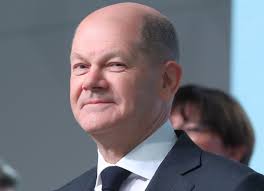3 November 2022
‘Germany First’
Chancellor Scholz breaks ranks.
By Neil Tidmarsh

Europe’s maverick states – Brexit Britain, Orban’s Hungary, Duda’s Poland… and now Scholtz’s Germany? For some months, chancellor Olaf Scholtz’s government has been putting noses out of joint among its partners in the EU and in the wider West. But the last two weeks have seen Germany breaking ranks to an alarming degree.
Other EU states have been exasperated by Germany’s objections to various plans for an EU-wide package of price-caps and subsidies to combat the current energy crisis ever since it began. Last week, exasperation turned into something stronger when Germany announced that it was going it alone with unilateral initiatives for tackling the crisis, including subsidies of €200 billion for German industries. Commissioners and prime ministers from other EU countries, including France, Italy, Finland and Estonia, spoke out against Scholtz’s ‘Germany First’ policy and called for more solidarity. Poland’s prime minister Mateusz Morawiecki said “the richest country, the most powerful EU country is trying to use this crisis to gain a competitive advantage for their businesses on the single market. This is not fair, this is not how the single market should work.”
Germany’s maverick initiatives are even alienating France, its partner in the relationship at the heart of the EU. The two countries hold regular summits with each other, but the most recent one – due last week – was cancelled and won’t take place until next year. “I don’t think it’s good for Germany or for Europe if Germany isolates itself” Macron said, while insisting “For me, my wish has always been to preserve European unity and also the friendship and the alliance between France and Germany.” That wish has been sorely strained in the last two weeks.
France, with Italy, has been promoting the idea of an air and missile defence shield for Europe, to be developed within the EU. But Scholz has been negotiating an alternative and rival scheme involving Nato countries within and without the EU; his ‘European Sky Shield Initiative’ was formalised last week in a ‘letter of intent’ to Nato. It brings together 14 countries, including the UK and other northern and eastern European states, but an infuriated France has chosen not to participate in what it must consider to be another example of its closest partner breaking ranks.
Also last week, Scholz continued to press forward with another plan which Macron fiercely opposes; a new gas pipeline from Spain to northern Europe. Germany is hoping that this would make up for the lost Russian supply, but the French president, supported by the EU Commission, protests that it’s not economically viable. Scholz is now apparently exploring the possibility of routing the pipeline round France rather than through it.
But it’s Scholz’s recent overtures to China which have most alarmed his allies. Last week he gave the go-ahead for China to take a stake in one of the shipping terminals in the port of Hamburg. This week it was reported that he’s preparing to allow a Swedish subsidiary of a Chinese company to buy the Dortmund-based microchip manufacturer Elmos. Tomorrow he’ll travel to China, to visit President Xi in Beijing, hot on the heels of the Chinese leader’s triumph in the CCP’s 20th Congress (Scholtz will be the first leader of a major Western country to visit Beijing since the start of the pandemic).
He forced through approval of the Hamburg deal against the opposition of six of his ministers and his two coalition partners, the advice of Germany’s two biggest intelligence agencies and the concerns and wishes of his own citizens. (According to recent polls, 73% of Germans would like such deals to be disallowed, 60% of them take a negative view of China’s influence on the world and 66% want Germany to reduce its economic reliance on China even if that would involve material sacrifices.) His trip to Beijing has alarmed the US and many European countries who believe that the West should be showing a united front against China’s increasingly authoritarian, repressive and assertive regime and its human rights abuses. Such misgivings appear to be so strong that Scholz has had to send his national security adviser Jens Plötner to Washington to make reassuring noises.
But Scholtz’s main concern is, of course, the Germany economy (“it’s all about business, business, business” as Zelensky said when he lambasted the Bundestag recently). The lead-up to the visit has seen a number of business deals signed between the two countries and he’ll be accompanied by the bosses of German industrial giants such as Siemens and BASF which are investing billions of euros in Chinese enterprises. “China is Germany’s largest trade partner” wrote Oliver Moody in The Times this week, “and German industry depends heavily on China as an export market and a source of critical imports such as rare earth materials and renewable energy technology.”
Scholz is building on Angela Merkel’s success in establishing economic privileges for Germany in China. No doubt he’s hoping that new successes there might off-set the collapse of Germany’s economic ties with Russia, pursued so vigorously (and, in retrospect, so disastrously and recklessly) by his predecessors and his party in the very recent past. But is Germany about to make the same mistake all over again? It was entirely reliant on energy from Russia until Russia’s invasion of Ukraine put Russia’s oil and gas out of bounds, but the German business lobby BDI reported last week that the country is even more reliant on minerals from China than it ever was on energy from Russia. If Russia’s invasion of Ukraine threatened to cripple Germany’s economy, what would a Chinese invasion of Taiwan do for it?


